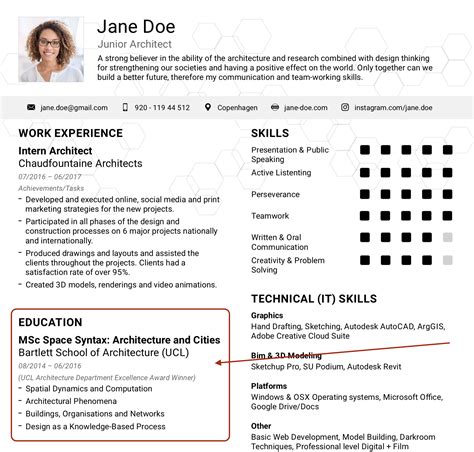Listing Education On A Resume: Best Options

When it comes to creating a resume, listing your education is an essential component that can make or break your chances of landing your dream job. The way you present your education can influence how potential employers perceive your qualifications and skills. Here are some of the best options for listing education on a resume:
1. Include Relevant Education Only
When listing education on a resume, it is important to include only relevant education. This means including degrees, certifications, and diplomas that are related to the job you are applying for. Including irrelevant education can make your resume appear cluttered and unfocused.
2. Highlight Your Highest Degree
If you have multiple degrees, it is a good idea to highlight your highest degree. This can help potential employers quickly identify your level of education and qualifications. For example:
Bachelor of Science in Computer Science, XYZ University
Master of Science in Computer Science, ABC University
In this case, you would highlight your Master’s degree because it is your highest level of education.
3. Include Your GPA
If you are a recent graduate, including your GPA can be a good way to demonstrate your academic performance and potential. However, if your GPA is not particularly strong, it may be best to leave it off your resume.
4. Add Relevant Coursework
If you have completed coursework that is relevant to the job you are applying for, consider including it on your resume. This can help demonstrate your knowledge and skills in a specific area. For example:
Bachelor of Science in Marketing, XYZ University
Relevant Coursework: Consumer Behavior, Marketing Research, Brand Management
5. List Education in Reverse Chronological Order
When listing education on a resume, it is generally best to list it in reverse chronological order. This means starting with your most recent degree and working backwards. This helps potential employers quickly identify your most recent qualifications.
6. Include Relevant Certifications
If you have earned any relevant certifications or licenses, be sure to include them on your resume. This can help demonstrate your expertise and qualifications in a specific area. For example:
Bachelor of Science in Nursing, XYZ University
Certifications: Registered Nurse (RN), Basic Life Support (BLS), Advanced Cardiac Life Support (ACLS)
7. Mention Honors and Awards
If you received any honors or awards during your education, consider including them on your resume. This can help demonstrate your academic excellence and dedication. For example:
Bachelor of Arts in English, XYZ University
Summa Cum Laude
8. Add Relevant Extracurricular Activities
If you participated in any relevant extracurricular activities during your education, consider including them on your resume. This can help demonstrate your leadership skills and ability to work in a team. For example:
Bachelor of Science in Business Administration, XYZ University
Extracurricular Activities: President, Business Club; Volunteer, Habitat for Humanity
9. Include Relevant Research Projects
If you completed any relevant research projects during your education, consider including them on your resume. This can help demonstrate your analytical skills and ability to conduct research. For example:
Bachelor of Science in Psychology, XYZ University
Research Projects: Effects of Social Media on Mental Health; Cognitive Processes in Attention and Perception
10. Tailor Your Education Listing to the Job
When listing your education on a resume, it is important to tailor it to the job you are applying for. This means highlighting the degrees, certifications, and coursework that are most relevant to the job. This can help demonstrate your qualifications and increase your chances of getting hired.
Conclusion
Listing education on a resume is an important component that can help demonstrate your qualifications and skills. By including relevant education, highlighting your highest degree, and tailoring your education listing to the job, you can increase your chances of getting hired. Be sure to include any relevant certifications, awards, extracurricular activities, and research projects that can help demonstrate your expertise and qualifications in a specific area.
FAQs
What if I don’t have any relevant education?
If you don’t have any relevant education, focus on highlighting your skills and experience instead. Consider including any relevant certifications or training programs you have completed.
Should I include my high school education?
If you have completed higher education, it is generally not necessary to include your high school education on your resume. However, if you are a recent high school graduate or have no higher education, it may be appropriate to include your high school education.
What if I have a low GPA?
If your GPA is not particularly strong, it may be best to leave it off your resume. Instead, focus on highlighting your skills and experience.
Should I include incomplete degrees?
If you have completed a significant amount of coursework towards a degree but have not yet completed it, it may be appropriate to include it on your resume. However, if you have not completed a significant amount of coursework, it may be best to leave it off.
What if I have multiple degrees?
If you have multiple degrees, it is generally best to highlight your highest degree. However, you can still include your other degrees in your education listing.
